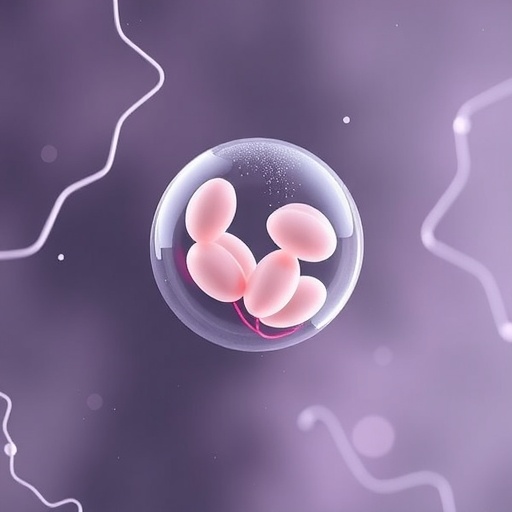
In the realm of reproductive medicine, the role of luteinizing hormone (LH) in the context of hormone replacement therapy (HRT) has increasingly drawn interest among researchers and clinicians alike. Recent studies have illuminated the significance of pre-progesterone serum LH levels in frozen-thawed embryo transfer (FET) cycles, suggesting that these levels may hold the key to successful pregnancy outcomes. Notably, the compelling research conducted by Han et al. delves deep into this crucial area, shedding light on a dimension of reproductive endocrinology that has been overlooked in previous studies.
The study meticulously evaluates the impact of serum LH levels on pregnancy rates after the administration of progesterone during HRT-FET procedures. It is well established in reproductive science that both estrogen and progesterone play significant roles in preparing the endometrium for embryo implantation. However, the potential influence of LH, particularly in women undergoing HRT to optimize their chances of conception, warrants further exploration. Han and colleagues set out to fill this gap, drawing on a substantial pool of clinical data to analyze outcomes associated with varying LH levels prior to the commencement of progesterone treatment.
Understanding LH’s role in reproductive function necessitates a thorough comprehension of its biological underpinnings. LH, a hormone produced by the pituitary gland, is critical in regulating the physiological processes of ovulation and corpus luteum formation. In a natural cycle, LH surges trigger ovulation, but in the context of HRT, the regulation and timing of LH administration need to be precisely managed. The study by Han et al. emphasizes the importance of timing and dosage, demonstrating how pre-treatment LH levels can influence the uterine environment and the embryo’s capacity to implant.
The research participants in this study were meticulously selected to ensure a comprehensive analysis of the effects of LH before progesterone administration. This selection process included women with varying infertility diagnoses who were undergoing FET cycles as part of a broader therapeutic strategy. By taking a holistic approach that encompasses clinical history, hormonal profiles, and their subsequent impact on pregnancy outcomes, this study showcases the intricacies of female reproductive health.
Han et al. employed a robust statistical framework to dissect the relationships between LH levels and clinical outcomes, including implantation rates and live birth rates. This rigorous analysis not only reinforces the credibility of their findings but also solidifies their place within the broader context of reproductive endocrinology research. The study provides compelling evidence that inadequate or excessive LH levels can create a hormonal milieu that is detrimental to pregnancy success.
Furthermore, the research articulates the hypothesis that optimal LH levels can enhance the receptivity of the endometrium, making it more conducive to embryo implantation. This hypothesis is grounded in the physiological interplay between LH and other ovarian hormones that contribute to the ideal endometrial state necessary for successful pregnancy. The implications of these findings extend to clinical practices, paving the way for more tailored and personalized approaches to HRT in fertility treatments.
The exploration of hormones often extends into the realm of patient experience, where the emotional and psychological dimensions of undergoing fertility treatments play a pivotal role. The landscape of assisted reproduction can be laden with stress, uncertainty, and emotional upheaval, and understanding the biochemical underpinnings of fertility can empower patients. Han et al.’s research thus not only contributes to the scientific community but also serves as a beacon of hope for couples navigating the complexities of infertility.
In today’s context, where personalized medicine is revolutionizing various fields, the application of such research is pivotal. Clinicians may utilize insights from Han et al. to tailor HRT protocols to the individual needs of patients, taking into consideration their LH levels when planning treatment strategies. This results in a more nuanced understanding of fertility treatments, reinforcing the principle that one-size-fits-all approaches may not suffice in achieving optimal reproductive outcomes.
Moreover, the global implications of this research are significant. As reproductive technologies continue to evolve, understanding the hormonal dynamics at play could influence healthcare policies, funding for research, and, importantly, access to fertility treatments worldwide. As healthcare systems grapple with meeting the increasing demands for fertility assistance, the insights from Han et al.’s work will surely inform best practices, serving to enhance patient care globally.
In the wake of this research, future studies are likely to expand on these findings, investigating not only the timing and levels of LH but also the potential interactions between LH and other hormones, such as follicle-stimulating hormone (FSH), estradiol, and progesterone. The interconnected nature of these hormones and their collective influence on reproductive outcomes warrants a comprehensive approach that encompasses both clinical and laboratory perspectives.
In conclusion, the study conducted by Han et al. significantly bridges a crucial gap in our understanding of reproductive endocrinology as it relates to hormone replacement therapy and frozen-thawed embryo transfer cycles. By elucidating the impacts of serum LH levels before progesterone treatment, this research offers a transformative perspective on improving clinical outcomes in assisted reproduction. As we continue to unravel the complexities of hormonal interactions within the reproductive system, we edge closer to not only enhancing clinical practices but also inspiring hope for those aspiring to conceive.
The convergence of scientific research and patient-centered care remains at the forefront of reproductive health, emphasizing the importance of individualized treatment strategies. In light of Han et al.’s pivotal findings, the scientific and medical communities must remain committed to investigating the nuances of reproductive endocrinology as we collectively strive for improved fertility outcomes across the globe.
As we embark on this journey, it is essential that we maintain a multidisciplinary approach, integrating clinical insights, patient experiences, and cutting-edge research to propel the field of reproductive medicine forward.
Subject of Research: The Impact of Serum LH Levels Before Progesterone Administration on Pregnancy Outcomes in Hormone Replacement Therapy-Frozen-Thawed Embryo Transfer Cycles
Article Title: Serum LH levels before progesterone administration significantly affect pregnancy outcomes in hormone replacement therapy-frozen-thawed embryo transfer cycles.
Article References:
Han, X., Liu, C., Wang, J. et al. Serum LH levels before progesterone administration significantly affect pregnancy outcomes in hormone replacement therapy-frozen-thawed embryo transfer cycles.
J Ovarian Res 18, 158 (2025). https://doi.org/10.1186/s13048-025-01743-x
Image Credits: AI Generated
DOI: 10.1186/s13048-025-01743-x
Keywords: LH levels, progesterone, hormone replacement therapy, frozen-thawed embryo transfer, pregnancy outcomes.
Tags: clinical data on hormone levels and conceptionendometrial preparation for embryo transferhormone replacement therapy and pregnancy outcomesimpact of LH on embryo implantationluteinizing hormone and frozen embryo transfermaternal hormone levels and fertilityoptimizing chances of conception with LHpre-progesterone LH levels significanceprogesterone administration in FET cyclesreproductive function and hormone influencereproductive medicine research studiesserum LH levels and reproductive endocrinology




